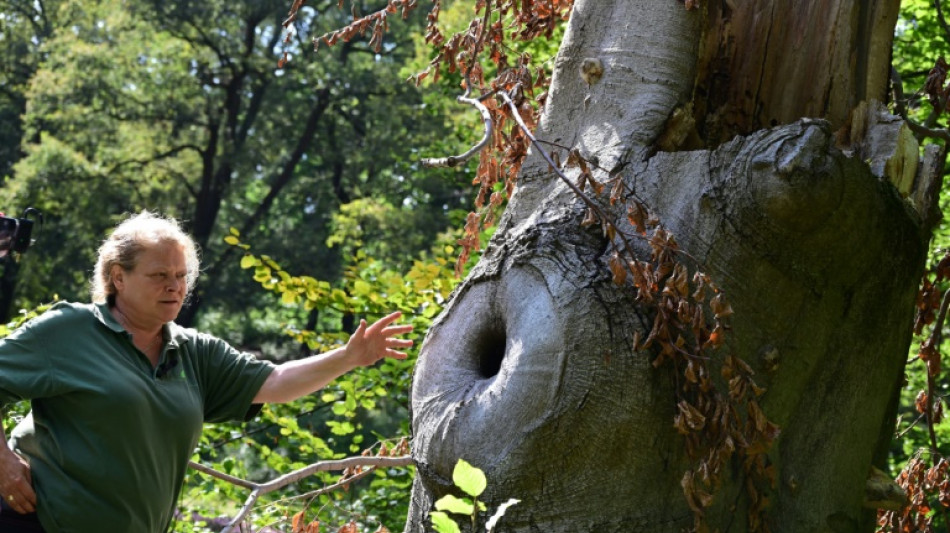
-
 Osaka gets 'revenge' on Muchova in Australian Open fightback
Osaka gets 'revenge' on Muchova in Australian Open fightback
-
Mitchell leads Cavs over Pacers, Thunder beat 76ers

-
 S. Korea's Yoon: from rising star to historic arrest
S. Korea's Yoon: from rising star to historic arrest
-
Ominous Alcaraz sweeps into Australian Open third round

-
 'Queen Wen' deposed in huge shock at Australian Open
'Queen Wen' deposed in huge shock at Australian Open
-
Vigilante fire clean-up launched by local Los Angeles contractor

-
 Zheng dumped out in huge shock as shaky Sabalenka battles through
Zheng dumped out in huge shock as shaky Sabalenka battles through
-
Asian equities mixed as US inflation, China data loom

-
 'Queen Wen' Zheng deposed in huge shock at Australian Open
'Queen Wen' Zheng deposed in huge shock at Australian Open
-
Renewed US trade war threatens China's 'lifeline'

-
 China's economy seen slowing further in 2024: AFP survey
China's economy seen slowing further in 2024: AFP survey
-
Shaky Sabalenka overcomes serve struggles to stay alive in Melbourne

-
 South Korea's six weeks of political chaos
South Korea's six weeks of political chaos
-
Japan's tourism boom prices out business travellers

-
 What is the pink stuff coating fire-ravaged Los Angeles?
What is the pink stuff coating fire-ravaged Los Angeles?
-
Mediators make final push for Gaza truce deal

-
 Musk, Bezos, Zuckerberg to attend Trump inauguration: report
Musk, Bezos, Zuckerberg to attend Trump inauguration: report
-
Federal probe begins into deadly Los Angeles fires

-
 'We may look easy-going, but...' Canadians veto Trump's merger plan
'We may look easy-going, but...' Canadians veto Trump's merger plan
-
Is obesity a disease? Sometimes but not always, experts decide

-
 Biden issues land protections after LA fires delay ceremony
Biden issues land protections after LA fires delay ceremony
-
Cuba to free over 550 prisoners after removal from US terror list

-
 Williams, Vine vie for season-opening Tour Down Under crown
Williams, Vine vie for season-opening Tour Down Under crown
-
Maresca 'concerned' as Chelsea winless run stretches to five games

-
 'Outstanding' Liverpool deserved more than Forest draw: Slot
'Outstanding' Liverpool deserved more than Forest draw: Slot
-
Guardiola laments Man City decision-making in Brentford collapse

-
 Marseille dumped out of French Cup on penalties
Marseille dumped out of French Cup on penalties
-
Liverpool frustrated by Forest, Man City blow late lead at Brentford

-
 Djokovic, Sabalenka chase history as Australian Open hits round two
Djokovic, Sabalenka chase history as Australian Open hits round two
-
Golf star Woods pledges support amid 'unimaginable loss' of LA fires

-
 Liverpool held by Forest, Man City blow late lead at Brentford
Liverpool held by Forest, Man City blow late lead at Brentford
-
Cuba to free 553 prisoners after removal from US terror list

-
 Leverkusen win to go one point behind Bayern, Kiel down Dortmund
Leverkusen win to go one point behind Bayern, Kiel down Dortmund
-
Jota rescues leaders Liverpool in Forest draw

-
 Title chasers Atalanta held by Juve, Milan hand Conceicao maiden Serie A win
Title chasers Atalanta held by Juve, Milan hand Conceicao maiden Serie A win
-
Man City blow late lead at Brentford, Chelsea held by Bournemouth

-
 Rast charges through on second run to win Flachau slalom
Rast charges through on second run to win Flachau slalom
-
Grimaldo scores as Leverkusen go one point behind Bayern, Dortmund lose

-
 Starbucks shift on non-paying visitors stirs debate in US
Starbucks shift on non-paying visitors stirs debate in US
-
Clashes as S. Korean investigators attempt to arrest President Yoon

-
 US, Japanese lunar landers set to launch on single rocket
US, Japanese lunar landers set to launch on single rocket
-
Boeing 2024 plane deliveries tumble on labor, safety woes

-
 US removes Cuba from state sponsors of terror list
US removes Cuba from state sponsors of terror list
-
Argentine annual inflation nosedives, in boost for Milei

-
 S. Korea investigators arrive in new attempt to arrest President Yoon
S. Korea investigators arrive in new attempt to arrest President Yoon
-
Pressure builds on Dortmund boss Sahin after loss at Kiel

-
 Meta to lay off 3,600 employees in performance-based cuts
Meta to lay off 3,600 employees in performance-based cuts
-
Venezuela restricts diplomats from 'hostile' European countries

-
 Trump's Pentagon pick grilled by senators as cabinet hearings begin
Trump's Pentagon pick grilled by senators as cabinet hearings begin
-
From ban to buyout: What next for TikTok in the US?


Germany's parks plant a way forward on climate change
In the castle gardens of Muskauer Park, which straddles both banks of the German-Polish river border, caretakers have mounted a fightback against the impacts of climate change.
On the stump of a 150-year-old oak tree, gnawed by parasites and felled in a storm, a tender new shoot represents the estate's hope of adapting to rising temperatures and more frequent droughts.
As part of a "natural regeneration" project, the sapling was grafted onto its fallen predecessor by gardeners in the first step towards replacing the UNESCO-listed park's lost trees.
The young oak "will benefit from the roots of the old tree and will be more resistant to threats", gardener Jana Kretschmer told AFP.
By transmitting their DNA to the new saplings, the older trees "teach" their descendants how to adapt to less hospitable conditions.
"Nature shows the way, humans need only look on," said Kretschmer.
Drought and pests are among the silent killers encouraged by climate change, which weakens plants and has started to decimate the flora of the parklands on both sides of the Neisse river.
Some 180 beeches, ashes and oaks had to be felled there last year.
"Every year since 2018 we have to cut down more and more trees," said Kretschmer, the site's deputy manager, who bemoaned the loss of countless old trees as a "catastrophe".
- Natural cure -
In June, 15 German estates presented their plans to protect their gardens against the impacts of climate change.
At Muskauer Park, the groundskeepers are betting on the traditional method of natural regeneration to increase the tree-count.
Importing more resistant species of trees would be an option, but one that would be "neither sustainable, nor intelligent", said park manager Cord Panning.
A natural regeneration approach moreover promises savings in two scarce commodities: money and water.
Following the method, caretakers select the best young specimens to plant them in place of old trees, eschewing genetic engineering or any foreign transplants.
In time, they hope to restore virtually all of the trees in the 19th century garden that have been lost and felled.
Among the pests to have plagued the trees at Muskauer Park are the tinder fungus and the bark beetle.
"Usually, by the time you realise it, it is too late," said Kretschmer.
Long dry spells between 2018 and 2020 did nothing to help the situation, leaving the trees ever more vulnerable to attack.
- Fungal invasion -
Further south in Germany, at Nymphenburg Palace in Munich, the spread of the phytophthora fungus and invasive mistletoe species are depriving trees of water.
"The trees are experiencing dry stress, even in years where rainfall is sufficient," said Michael Degle, the palace's landscape architect.
The Munich park has had a system of "sustainable tree management" since 2018, which employs moisture sensors and new pruning techniques.
The project feeds into the joint efforts of over a dozen garden estates in Germany, including Muskauer Park, to develop effective responses to climate change.
But their work is "reaching its limits", according to the group's June report.
Already, 20 to 30 percent of their budget is spent on fixing climate damage -- a share which is only increasing.
According to their calculations, somewhere between 200 and 250 million euros ($220 and 275 million) would be needed in the long term to protect historic parks from rising temperatures.
The damage to trees at Muskauer Park by a warming climate will be on show at the estate's open day at the end of September.
An opportunity, according to Kretschmer, to show that trees "are not just wood, but living beings much more clever than us".
G.Schulte--BTB




